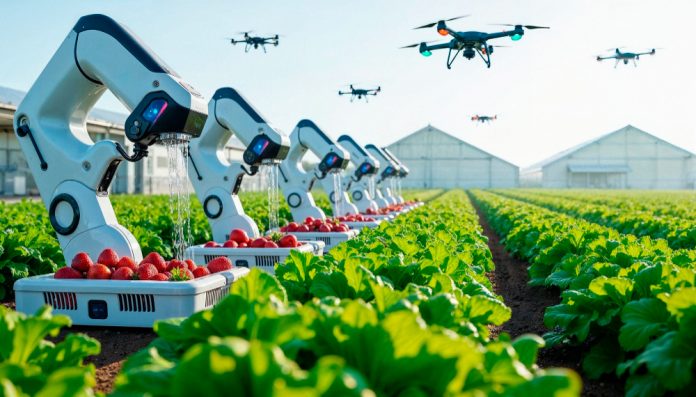Indian farmers face increasing challenges that directly impact productivity and income. Rising costs of seeds, fertilizers, and pesticides put pressure on margins. Labor shortages during peak seasons often delay spraying, leading to pest outbreaks and crop damage. Fragmented farmland makes uniform spraying difficult, while climate changes bring unpredictable weather patterns.
The Leher drone offers a practical solution that addresses these challenges head-on. Built for Indian agriculture, it combines advanced spraying technology with a simple app-based booking system. This allows farmers to access precision crop spraying without buying expensive equipment or hiring large teams. The goal is to save time, reduce costs, and protect crop health while making technology accessible even in remote areas.
How the Leher Drone Enhances Agricultural Efficiency
Agricultural efficiency is about producing more while using fewer resources. Leher Drone achieves this by combining precise spraying, high-speed operations, and smart adjustments during application.
Precision Spraying with AI-Powered Zonal Mapping
Leher Drone uses AI to map farm plots and identify affected areas with remarkable accuracy. It sprays only where treatment is needed, reducing chemical waste by up to 30%. This targeted approach prevents overuse of pesticides, keeping both crops and soil healthier.
GPS and sensor integration ensures uniform coverage, even in irregular or scattered fields. By avoiding overlaps, the drone ensures every drop is used effectively. Farmers no longer worry about untreated patches or double-sprayed areas, both of which can harm yield.
Speed and Scale of Operations
Traditional manual spraying is slow, especially when labour is scarce. A single Leher Drone can spray one acre in less than 10 minutes. In a single day, it can cover up to 50 acres with consistent accuracy.
Replacing large spraying teams with drones reduces labour costs up to 40%. For farmers, this means faster pest control during critical growth stages, avoiding yield losses due to delays. For entrepreneurs, it means serving more farms in less time, increasing service income.
Dynamic and Automated Spray Adjustment
Leher Drone is equipped with fogger nozzles and real-time flow control systems. These adjust spray volume based on crop density and stress detection mid-flight. Dense, high-stress areas get the needed dose, while healthy areas receive less.
This adaptive spraying method can reduce fertilizer and pesticide use by up to 40%. Farmers save on input costs while also reducing harmful chemical exposure to the soil, water, and surrounding environment.
The Impact on Crop Health and Yield
Well-timed, precise spraying can transform crop performance. Leher Drone improves plant health, prevents disease spread, and supports uniform crop development.
Early Detection and Rapid Response to Crop Stress
Using AI-powered image analysis, the drone detects early signs of pest attacks or nutrient deficiencies during flight. Farmers can take immediate action before the problem spreads.
Rapid treatment decisions help prevent yield losses of up to 20–40%. Instead of waiting for visible damage, interventions happen when plants can still fully recover.
Sustainable Farming Through Reduced Environmental Impact
Leher Drone uses far less water than manual spraying—up to 90% less in many cases. On crops like tea, pesticide residue has been reduced by up to 75% with targeted application.
Chemical runoff into nearby water bodies is minimized, helping protect soil health and local biodiversity. Farmers can meet market demands for safer, more environmentally responsible produce without sacrificing yield.
Measurable Yield Gains and Farm Data Insights
Uniform spraying ensures crops mature at the same pace, producing higher quality harvests. Farmers have reported yield increases of up to 30% after adopting drone spraying services.
The Leher app provides a dashboard to track spraying history, chemical usage, and crop improvement over time. This data helps farmers make better decisions for future seasons.
Accessibility and Empowerment Through Technology
Advanced spraying technology is no longer limited to large farms. Leher Drone’s app-based booking system makes it possible for any farmer to use this service on demand.
Supporting Rural Entrepreneurs as Drone Operators
Leher trains rural entrepreneurs to operate drones and provide spraying services in their communities. This creates new income opportunities while expanding the availability of drone spraying to more villages.
Farmers can book a spray session through the app, get the job done, and make payments after the service. The system is designed for ease and trust, making it simple for first-time users.
Adaptability to Diverse Indian Farm Conditions
Leher drones are built to work on crops ranging from paddy and wheat to cotton and tea. They handle varied farm sizes, from small half-acre plots to large holdings.
Offline functionality ensures the service works even in areas without continuous internet access. Farmers in remote villages benefit from the same advanced spraying technology as those in connected towns.
Conclusion
Drone spraying is set to become a common practice in Indian farming over the next decade. Leher Drone represents how precision agriculture can be practical, affordable, and accessible for smallholder farmers.
With growing awareness, more rural entrepreneurs will join as operators, increasing coverage across India. The combination of speed, cost savings, and crop health benefits ensures that drone spraying will be a key driver of agricultural progress in the years ahead.
By making advanced drone technology available through a simple app, Leher is helping farmers protect their crops, reduce input waste, and improve their income—one spray at a time.

